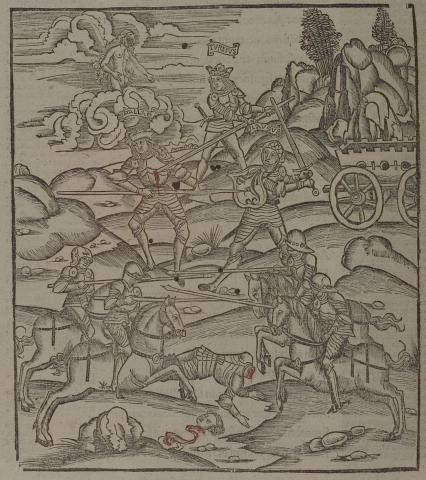CORE VOCABULARY
Curēs, ium, m.: a Sabine town east of Rome, 6.811.
fīdō, fīsus sum, 3, n.: to confide, trust, rely; freq., w. dat., 7.290; w. abl., 5.398; w. inf., dare, 5.69; p., fīdēns, entis, trusting, bold, confident, w. abl., dat., or gen., freq. (rel. to πείθω, persuade)
prīmaevus, a, um: adj. (prīmus and aevum), first in age; eldest born, 9.545; youthful, 10.345; early, 7.162.
Clausus, ī, m.: a chief of the Sabines, 7.707.
rigidus, a, um: adj. (rigeō), stiff, inflexible, unbending; of iron weapons, 12.304.
Dryops, opis, m.: Dryops, a Trojan follower of Aeneas, 10.346.
feriō, 4, a.: to smite or strike, 1.103; cut, 4.580; pierce, 12.304; slay, 10.315; strike or slay the covenant victim; hence, of a treaty, to make, 10.154.
ēminus: (adv.), from afar, at a distance, 10.346. (ē and manus)
hasta, ae, f.: a spear, 2.50, and freq.; hasta pūra, a headless spear, 6.760; pampinea hasta, a thyrsus, 7.396.
mentum, ī: the chin, 4.250; the beard, 6.809. (minor, to project)
graviter: (adv.), heavily; deadly, 7.753; greatly, deeply, 1.126; heavily, mournfully, 2.288. (gravis)
pariter: (adv.), equally, 2.729; also, in like manner, in the same manner, on equal terms, 1.572; side by side, 2.205; at the same time, 10.865; pariter — pariter, 8.545. (pār)
trāiciō, iēcī, iectus, 3, a. and n.: to throw across, over; pass over, cross, 6.536; pierce, 2.273; transfix, 1.355; p., trāiectus, a, um, drawn or passed through, 5.488; transfixed, pierced, 9.419. (trāns and iaciō)
guttur, uris, n.: the throat, 6.421.
crassus, a, um: (adj.), thick, gross, fat; clotted, 5.469.
vomō, uī, itus, 3, a.: to vomit; belch, vomit forth, 5.682.
cruor, ōris, m.: shed blood; gore, 3.43; 4.455; blood.
Thrēicius, a, um: (adj.), Thracian, 3.51, et al.; Thracian in character, northern, 11.659.
Boreās, ae, m.: the north wind, 3.687; the god of the north wind, Boreas, son of the river-god Strymon (others, the north), 10.350.
Īdās, ae, m.: 1. A Trojan warrior, 9.575. 2. A Thracian of Ismara, 10.351.
Ismara, ae, f.: a city al the foot of Ismarus, a mountain in Thrace, 10.351.
sternō, strāvī, strātus, 3, a.: to spread out, spread, 1.700; stretch on the ground, strike down, slay, 1.190; cast down, prostrate, devastate, 2.306; make level, smooth, calm, 5.763; spread, cover, 8.719; strew, litter; overthrow, conquer, 6.858; pass. (in middle sense), sternor, ī, to stretch one's self, lie down, 3.509.
accurrō, currī, seldom cucurrī, cursus, 3, n.: to run to; run, hasten up, 5.451. (ad and currō)
Halaesus, ī, m.: 1. An ally of Turnus, formerly companion of Agamemnon, 7.724. 2. Another ally of Turnus, 10.411.
Auruncus, a, um: adj. (Aurunca), Auruncan, of Aurunca, an ancient town of Campania, 12.94.
manus, ūs, f.: the hand, 1.487; freq.; (meton.), action, movement of the hand; work, art, handiwork, 3.486; prowess, heroic deed, action, 2.434; force, violence, 2.645; a collection of persons; a band, crew, troop; an army, 2.29; forces, 5.623; multitude, 6.660; pl., manūs, workmen, 11.329; dare manūs, to yield, 11.558; extrēma manus, the finishing hand or touch, 7.572.
subeō, iī, itus (p. subiēns, euntis), 4, n. and a.: to go or come under, into, or up to; alone, or with acc. and prep., or with dat.; without a case, come up, 2.216; go under, bend, stoop down under, 10.522; come after; follow, 2.725; take one's place, 12.471; enter, 1.171; come into or upon the mind, suggest itself, occur, 2.560; with acc. and prep., go, advance towards, 8.359; with dat., come or go up to, down to, into, 5.203; succeed to, 5.176; come after, follow, 10.371; with acc., approach, enter, 1.400; go under a burden, bear, with abl. of instrument, 2.708; go under the yoke, draw, 3.113; enter the mind of, strike, occur to, 9.757; approach, reach, 3.512; approach, 7.22; meet, encounter, 10.798; attack, 9.344.
Neptūnius, a, um: adj. (Neptūnus), pertaining to Neptune, built by Neptune, Neptunian, 2.625; son or descendant of Neptune, 7.691.
prōlēs, is, f.: that which springs forth; offspring, race, progeny, 1.75; lineage, 3.180.
īnsīgnis, e: beautiful, 3.468; splendid, adorned, 4.134; conspicuous, 6.808; marked, renowned, distinguished, 1.10; illustrious, glorious, 10.450. (in and sīgnum)
Messāpus, ī, m.: a Latin chief, allied with Turnus, 7.691, et al.
expellō, pulī, pulsus, 3, a.: to drive out; drive or carry up; banish, 1.620; repel, drive, 10.354.
Ausonia, ae, f.: an ancient name of middle and lower Italy; Italy, in general, 3.496.
discors, cordis: adj. (dis- and cor), disagreeing, 2.423; hostile, 9.688; opposing, contending, 10.356.
ceu: (adv. and conj.), as, just as, 5.88; as if, 2.438, et al. (ce-ve)
nūbilum, ī, n.: cloudy weather.
anceps, cipitis: adj. (am- and caput), two-headed or two-edged, 7.525; (fig.), twofold, 3.47; uncertain, wavering, doubtful, 5.654; 10.304; perplexed, perplexing, intricate, 5.589.
obnītor, nīxus or nīsus sum, 3, dep. n.: to press, push against, w. dat., 12.105; without an object, push, 4.406; struggle, resist, 4.332; bear up, 5.21; strive, strike against, 5.206.
contrā: (prep. and adv.; prep. w. acc.), over against; opposite to, 1.13; against, 5.370; to, 9.280; on the contrary, 12.779; on the other hand, in reply, 1.76.
Trōiānus, a, um: adj. (Trōia), Trojan, 1.19; subst., Trōiānus, ī, m., a Trojan, 1.286; pl., Trōiānī, ōrum, m., the Trojans, 5.688.
Latīnus, a, um: adj. (Latium), of Latium; Latin, 1.6, et al.; Latīna, ae, f., a Latin woman, 12.604.
concurrō, currī (rarely cucurrī), cursus, 3, n.: to run together or at once; crowd around, 12.297; rush, 2.315; rush to conflict, 7.224; rush against a foe; (with dat.), engage, encounter, 1.493.
haereō, haesī, haesus, 2, n.: to stick; foll. by dat., or by abl. w. or without a prep.; hang, cling, adhere, cling to, 1.476, et al.; stop, stand fixed, 6.559; halt, 11.699; adhere to as companion, 10.780; stick to in the chase, 12.754; persist, 2.654; dwell, 4.4; pause, hesitate, 3.597; be fixed or decreed, 4.614.
dēnsus, a, um: (adj.), thick, dense, crowded, compact, in close array, serried, 2.383; frequent, 5.459.

